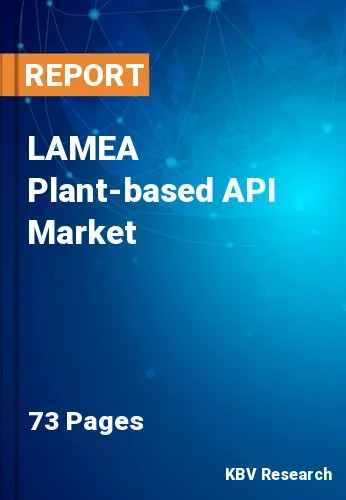The Latin America, Middle East and Africa Plant-based API Market would witness market growth of 9.9% CAGR during the forecast period (2023-2030).
The demand for plant-based APIs is increasing because of the preference for herbal medicines. In herbal therapy, herbal remedies are utilized in place of conventional pharmaceuticals. They alleviate symptoms, treat or prevent illnesses, boost energy, unwind, or reduce weight. Unlike medications, herbs are not subject to strict testing and regulation. In the coming years, the demand for herbal medicines would expand, and vendors would have opportunities to address equivalent requests.
Extraction, exploration, as well as screening of biological diversity, such as herbs, spices, microbes, and other natural resources, have evolved into essential practices around the region. The pharmaceutical industry has widely used phytochemicals, naturally occurring bioactive compounds produced from diverse plant parts, to develop several drugs for the treatment of various ailments. Phytochemicals are principally responsible for biological activities. Today, it is discovered that over 100 active compounds used in medications and treatments come from plants.
According to the Export.Gov, 59.4% of the pharmaceutical products purchased in the Gulf region are from the Kingdom of Saudi Arabia. Both the public and private sectors were strongly encouraged to grow the life sciences sector in general and the pharmaceuticals sector in particular by Saudi Arabia's Vision 2030 and the NTP's targets for job creation as well as economic diversification. The Kingdom's expanding population, the rise in healthcare spending per capita, and the tendency to favor research-based medicines over more expensive patented items are the main factors influencing the pharmaceutical business. In recent years, the government's initiatives to reduce pharmaceutical spending and support local manufacturing led to a quick expansion of the generics sector. Due to these factors, the regional market will develop expeditiously in the coming years.
The Brazil market dominated the LAMEA Plant-based API Market by Country in 2022, and would continue to be a dominant market till 2030; thereby, achieving a market value of $921.8 million by 2030. The Argentina market is anticipated to showcase a CAGR of 10.5% during (2023 - 2030). Additionally, The UAE market would witness a CAGR of 9.6% during (2023 - 2030).
Based on End-use, the market is segmented into Pharmaceuticals, Nutraceuticals, and Herbal Based Industries & Others. Based on Molecule Type, the market is segmented into Alkaloids, Anthocyanin, Flavonoids, Phenolic Acids, Lignin & Stilbenes, Terpenoids, and Others. Based on countries, the market is segmented into Brazil, Argentina, UAE, Saudi Arabia, South Africa, Nigeria, and Rest of LAMEA.
Free Valuable Insights: The Worldwide Plant-based API Market is Projected to reach USD 42.6 Billion by 2030, at a CAGR of 5.8%
The market research report covers the analysis of key stake holders of the market. Key companies profiled in the report include BASF SE, Evonik Industries AG (RAG-Stiftung), Cargill, Incorporated, Roquette Freres SA, Arboris, LLC, Centroflora Group, Kothari Phytochemicals & Industries Ltd., Brains Bioceutical Corp., Indo Phytochem Pharmaceuticals and HimPharm.
By End-use
By Molecule Type
By Country
Our team of dedicated experts can provide you with attractive expansion opportunities for your business.

